|
|
|
|
|
|
|
|
Welcome!
|

|
|
We are pleased to present you with a summary of the European Mission Soil Week, a pioneering event held in Madrid from 21 to 23 November 2023. Due to the large participation, we present a special edition of the Mission Soil newsletter, with an overview of the event, testimonials and links to the main results. Look back with us at the highlights of what promises to be a key annual event for the European soil community!
|

|
|
|
|
|
European Mission Soil Week 2023
|

|
|
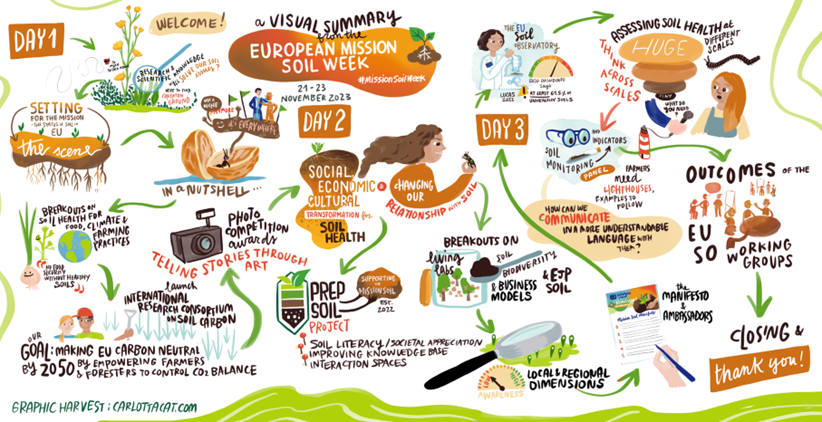
The European Mission Soil Week is designated to become an annual gathering for the European soil community. It brings together a mosaic of individuals, from researchers to business leaders, from politicians to farmers, from land managers to landowners, foresters, and the general public. The first edition was organised by the European Commission, Directorate-General for Agriculture and Rural Development (DG AGRI) in collaboration with the Joint Research Centre - EU Soil Observatory (EUSO), together with the EU funded project PREPSOIL, and hosted by the Spanish National Research Council (CSIC) under the Spanish Presidency of the Council of the EU.
The first edition of the event attracted over 300 in-person participants from across Europe and virtually involved 600 more, with over 1.5 million interactions on major social media. The 3-day event featured a series of keynote speeches, plenary and breakout sessions, an eye-catching photo competition, an enlightening 'Meet the Projects' stand and more.
With 92 speakers sharing their insights, experiences and suggestions, the European Mission Soil Week showcased the latest news and data on soil health, innovation and public engagement.
Plenary sessions
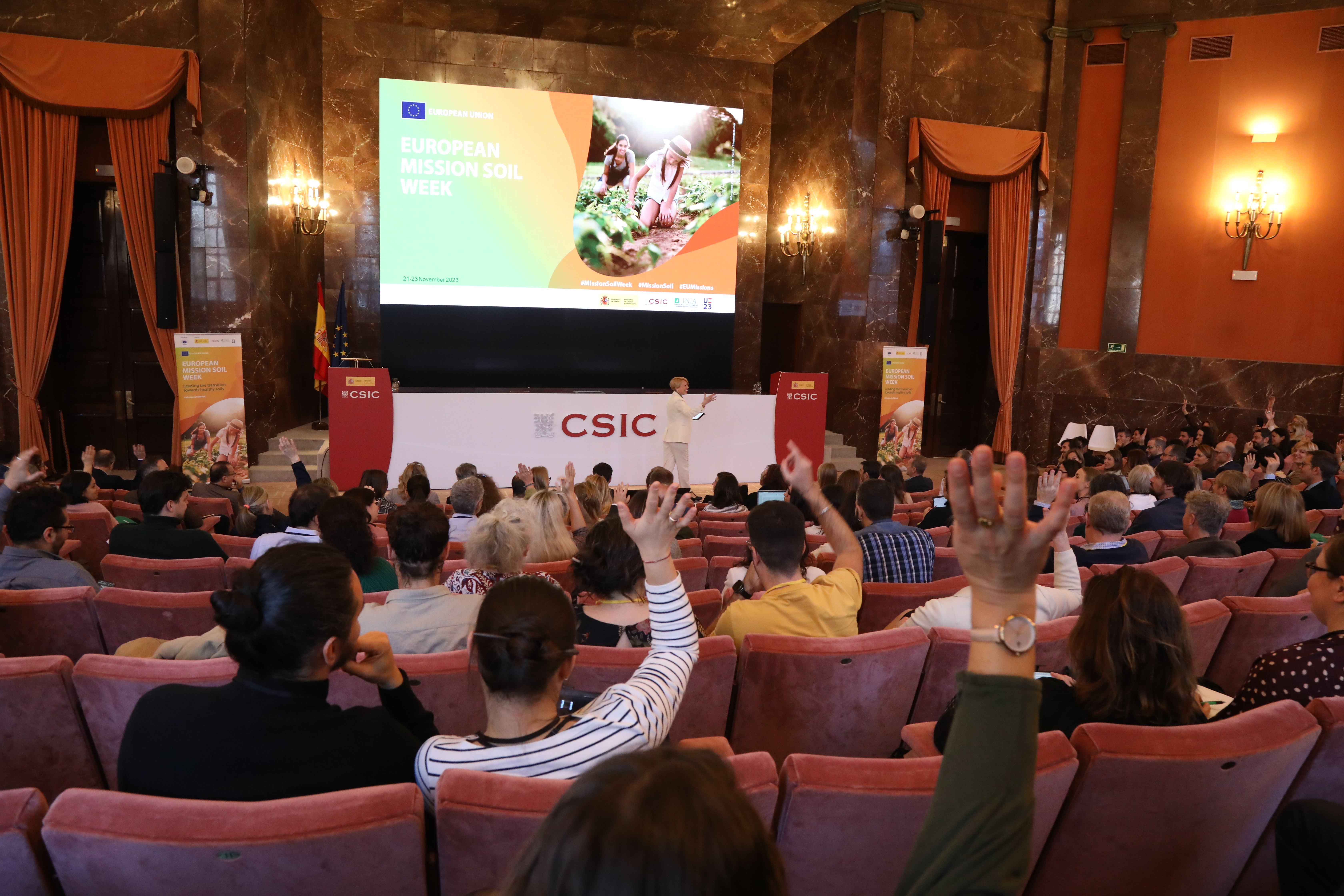
The event featured a wide range of inspiring plenary sessions. It started with a keynote speech on the current state of European soils, providing the basis for subsequent discussions.
Participants gained a comprehensive understanding of the Mission Soil through an in-depth overview, complemented by testimonials from land managers who shared first-hand experiences. They also had the opportunity to learn about the regional and international dimension of the Mission Soil in detail.
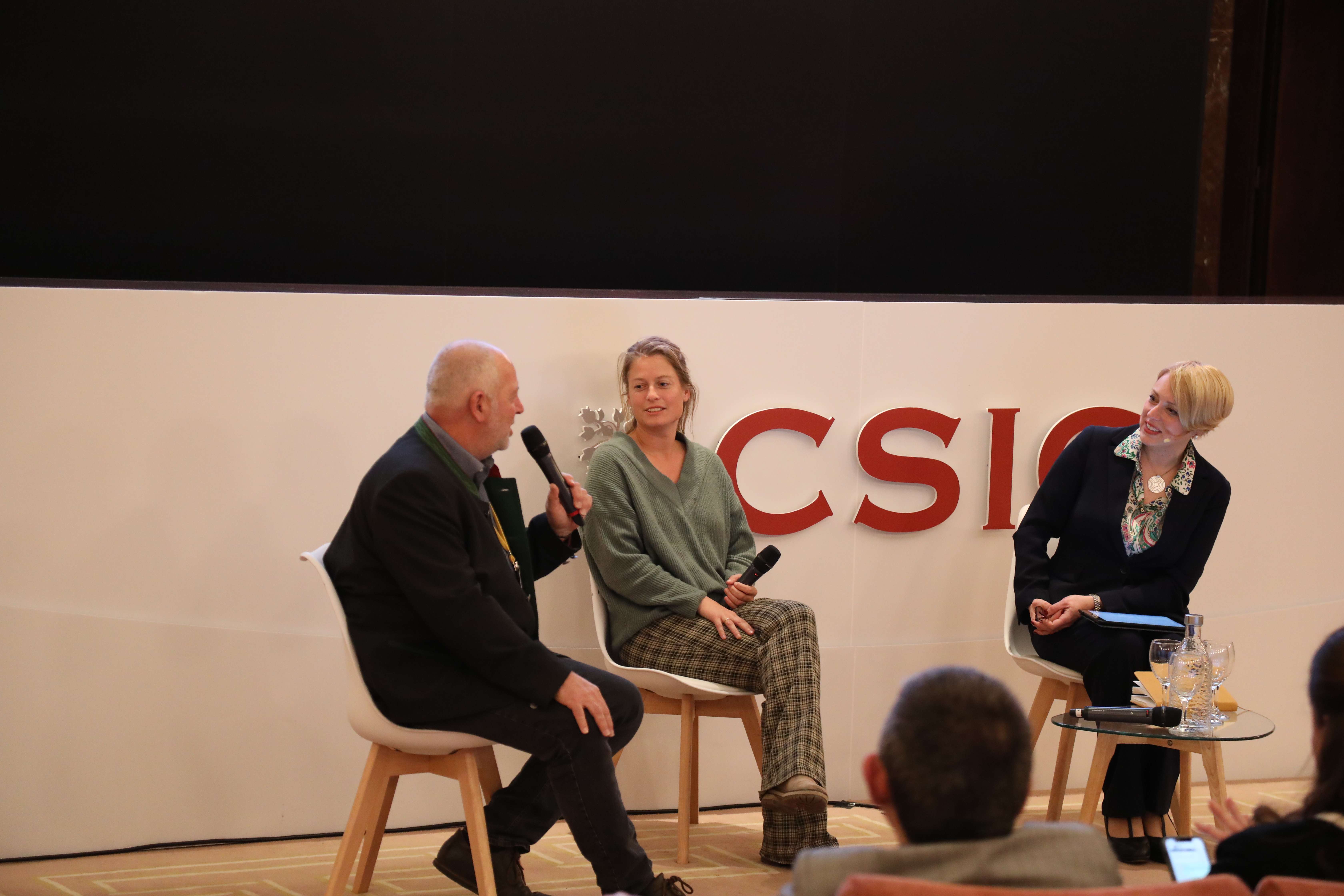
In a session dedicated to the Mission Soil Manifesto, the Commission called for the support of local and regional authorities and highlighted the shared responsibility among the different levels of governance in building a sustainable future for Europe. The narratives of Manifesto Signatories and Mission Soil Ambassadors offered personal perspectives that enriched our collective mission.
Another riveting keynote speech focused on the social, economic, and cultural transformations imperative for fostering soil health.
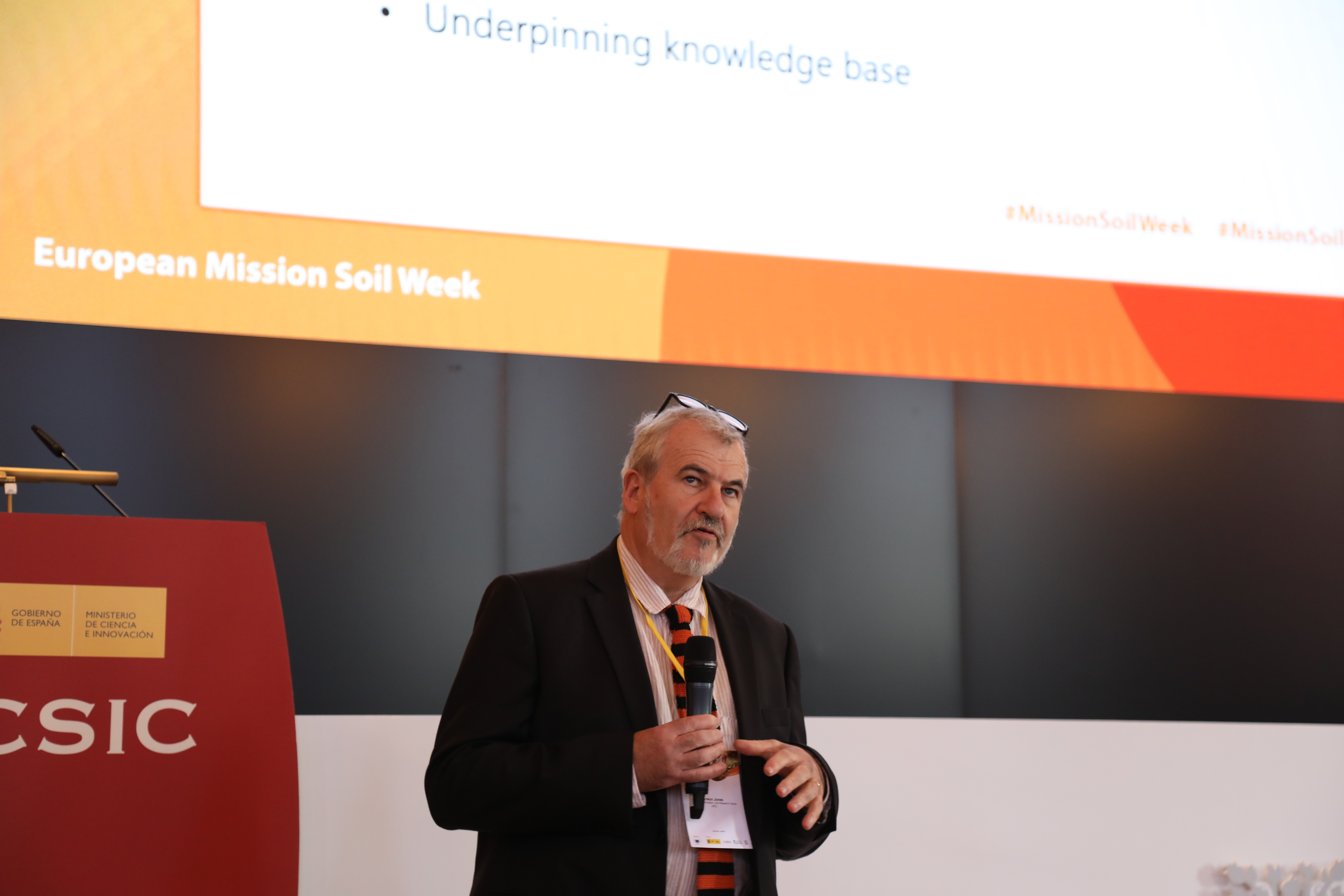
Appreciation for the significance of EUSO was cultivated, revealing key outcomes from its working groups on vital aspects like soil biodiversity, erosion, pollution, data sharing and integration, monitoring, and soil carbon. The presentations encapsulated the wealth of knowledge exchanged during those sessions, shaping the transition towards healthy soils.
In the links below you will find the presentation slides and full recordings from the plenary sessions:
- Day 1: View the presentation slides; watch the live recordings:
Part 1 Welcome and opening; Setting the scene for the Mission Soil
Part 2 The Mission Soil in a nutshell
Part 3 Launch of the International Research Consortium on Soil Carbon; Mission Soil photo competition award ceremony
- Day 2: View the presentation slides; watch the live recordings:
Part 1 Social, economic, and cultural transformations for soil health; PREPSOIL project: supporting the Mission Soil
Part 2 The Mission's regional and local dimension; Mission Manifesto and Mission Ambassadors
- Day 3: View the presentation slides; watch the live recordings:
Part 1 The EU Soil Observatory; Assessing soil health at different scales across Europe
Part 2 Soil monitoring and indicators
Part 3 Outcomes of the EUSO Working Groups; Closing ceremony
Breakout sessions
The breakout sessions allowed participants to take part in the most important debates around soils with like-minded individuals. Organised by policy leaders and experts, the eight breakout sessions tackled the latest issues, challenges and developments regarding soils in a truly collaborative and impactful way. A whole host of topics were discussed, including issues with farming practices, soil health for food, soil health for climate, business models for soil health, and much more!
The event was a fantastic opportunity to learn, share and connect with experts and individuals passionate about soil health. Below you will find more information about the different breakout sessions and links to their respective keynote presentation slides.
|
Soil health for climate
The objective of the session was to discuss synergies and trade-offs, between carbon sequestration and other soil ecosystem services, identifying policy options for future EU carbon farming schemes.
Participants emphasised synergies like biodiversity and climate adaptation, expressing a preference for a practice-based approach in current carbon farming schemes.
|
Soil health for food
Emphasising the link between healthy soil and food production, the discussion aimed to extend to the potential of waste valorisation as a key element in achieving a fair, healthy and environmentally friendly food system.
The participants advocated for robust policy measures as another cornerstone, emphasising the need for regulations that not only encourage but actively incentivise sustainable farming practices.
|
Farming practices for soil health
This session explored the contribution of farming practices to maintaining, improving or re-establishing soil health, while triggering the provision of other ecosystem services.
Among other conclusions, the session highlighted how adopting soil health as a guiding principle in farming involves assessing farming practice outputs and establishing robust monitoring systems, integrating soil monitoring and data collection.
|
Soil needs in PREPSOIL regions: engaging with multiple actors
This session was organised by the PREPSOIL project, and its objective was to inform the audience about the soil needs assessments performed by the project in regions covered by different land uses and to collect feedback from the audience for soil needs in other similar regions.
The session highlighted numerous environmental and socio-economic challenges in the project regions and proposed solutions specific to certain land uses: urban, forestry, agricultural, and mixed-land use.
|
Knowledge transfer to farmers’ advisers
The session covered several topics, including approaches to creating usable knowledge for (and with) farm advisers and addressing challenges of dissemination activities.
Participants discussed how the Mission Soil could improve knowledge transfer to farm advisers, focusing on refining the structure and approach of projects for practical impact.
|
Living Labs and other experiences from placed-based innovation
The session addressed Living Labs (LLs) as the Mission’s main instrument foreseen to close the knowledge – practice divide, thereby spurring the uptake of beneficial practices and innovations for soil health across land uses. The objective was to introduce the general concept of Living labs with a focus on sectors relevant to the Mission, to present the state-of-play of implementation of Living Labs under the Mission including the supporting mechanisms that are in place and finally to present existing experiences that show some of the characteristics of LLs.
Participants emphasised the need to collaborate. Whether engaging with local stakeholders, bridging the gap between research and practice, or navigating the complexities of urban projects, collective learning emerges as the strongest ally. The Mission Soil is not just a quest for healthier soils; it's a collective journey towards resilient soil management.
|
Soil biodiversity
The session demonstrated the vital role of ecosystem services provided by soil biodiversity, not only for global food security and agriculture, but also for water purification, climate stability and human health, as well as methods for measuring them.
Speakers emphasised the need to consider both taxonomic and functional diversity, align conservation practices with agriculture, and ensure economic viability.
|
Business models for soil health
The session aimed to shed light on the multi-faceted business cases for investing in soil health across different land uses.
The importance of collaboration and sustainable business models, valuing ecosystem services in financial terms, and integrating soil health into core business strategies were key themes.
|
|
Photo Competition and exhibition
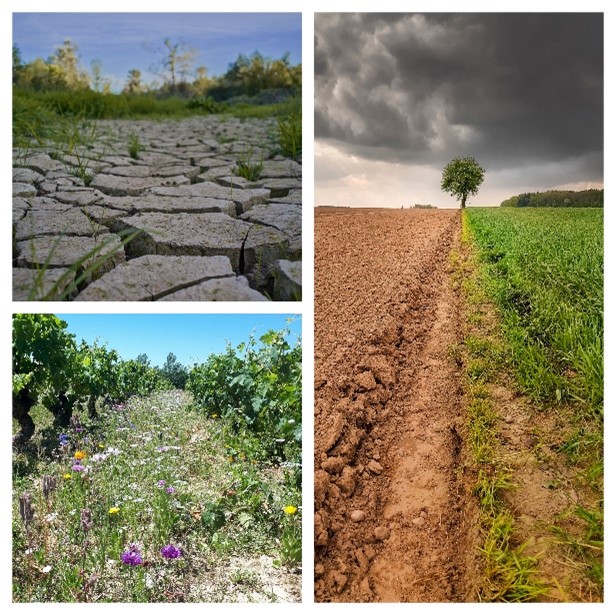
The Mission Soil Week included a special award ceremony for the three winners of the Mission Soil photo competition:
Dominika Koszowska (Poland) with ‘Treasure under our feet’ (right), capturing the contrast between plant greenery and soil brown; Sergio Ibáñez Pascual (Spain) with ‘Flowering vineyard soil’ (bottom left), highlighting cover crops for soil management, biodiversity promotion and erosion prevention; and Božidar Grgošić (Croatia) with ‘Desperate for life’ (top left), with a photo taken after river floods, symbolising the soil's need for attention and recovery.
A total of 12 photos were selected for capturing the importance and beauty of soil and displayed in an exhibition at the venue.
Meet the Projects (stand exhibition)
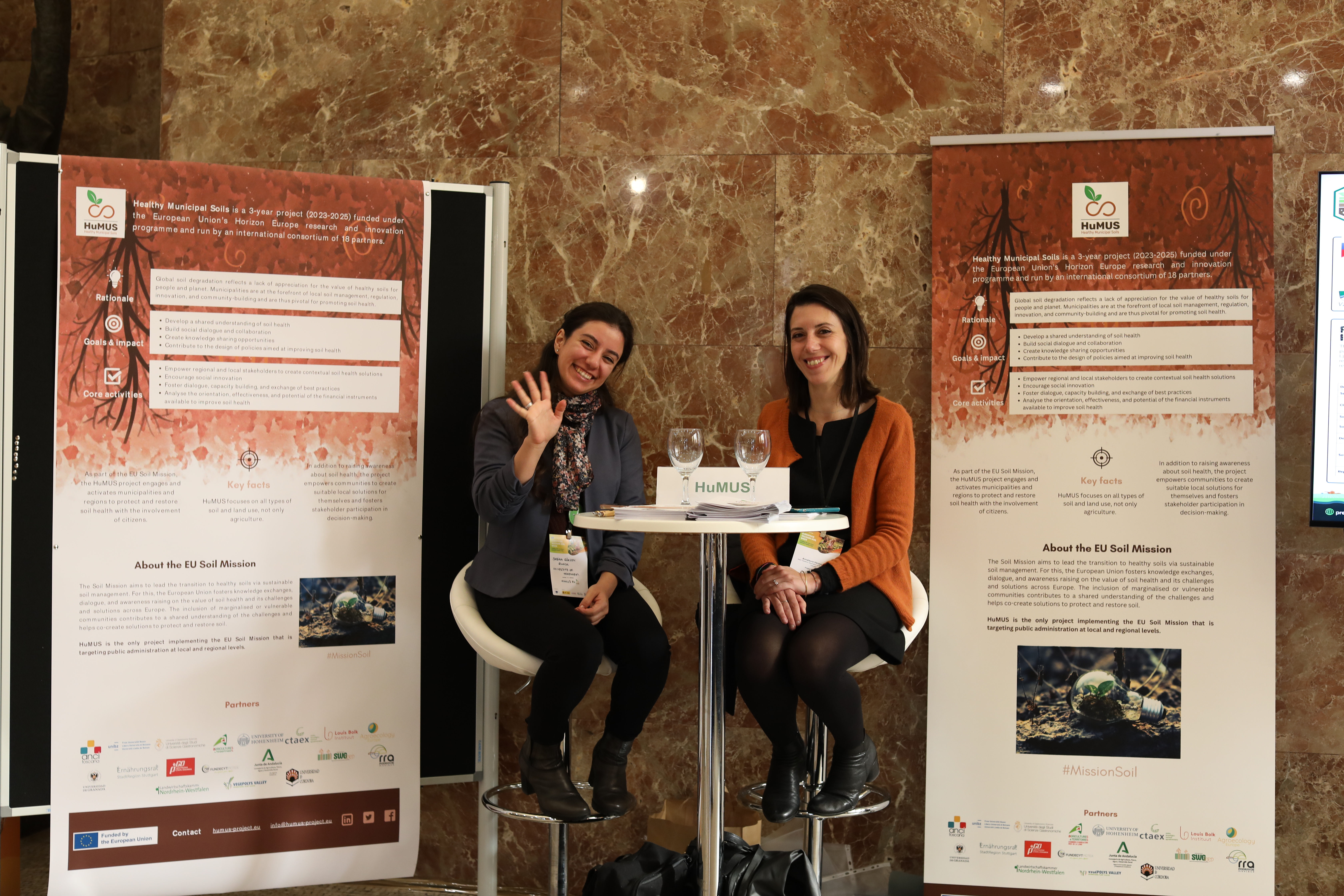
The event featured a ‘Meet the Projects’ stand exhibition, which gave participants the opportunity to meet representatives from the following Horizon Europe projects: ORCaSa, CREDIBLE, HuMUS, ECHO, LOESS and ISLANDR.
The exhibition was a great platform for participants to learn first-hand about what these projects are doing to raise awareness and improve soil health.
In addition to the exhibition, information about the 28 Mission-funded projects was made available onsite and in the event catalogue.
PREPSOIL poster exhibition
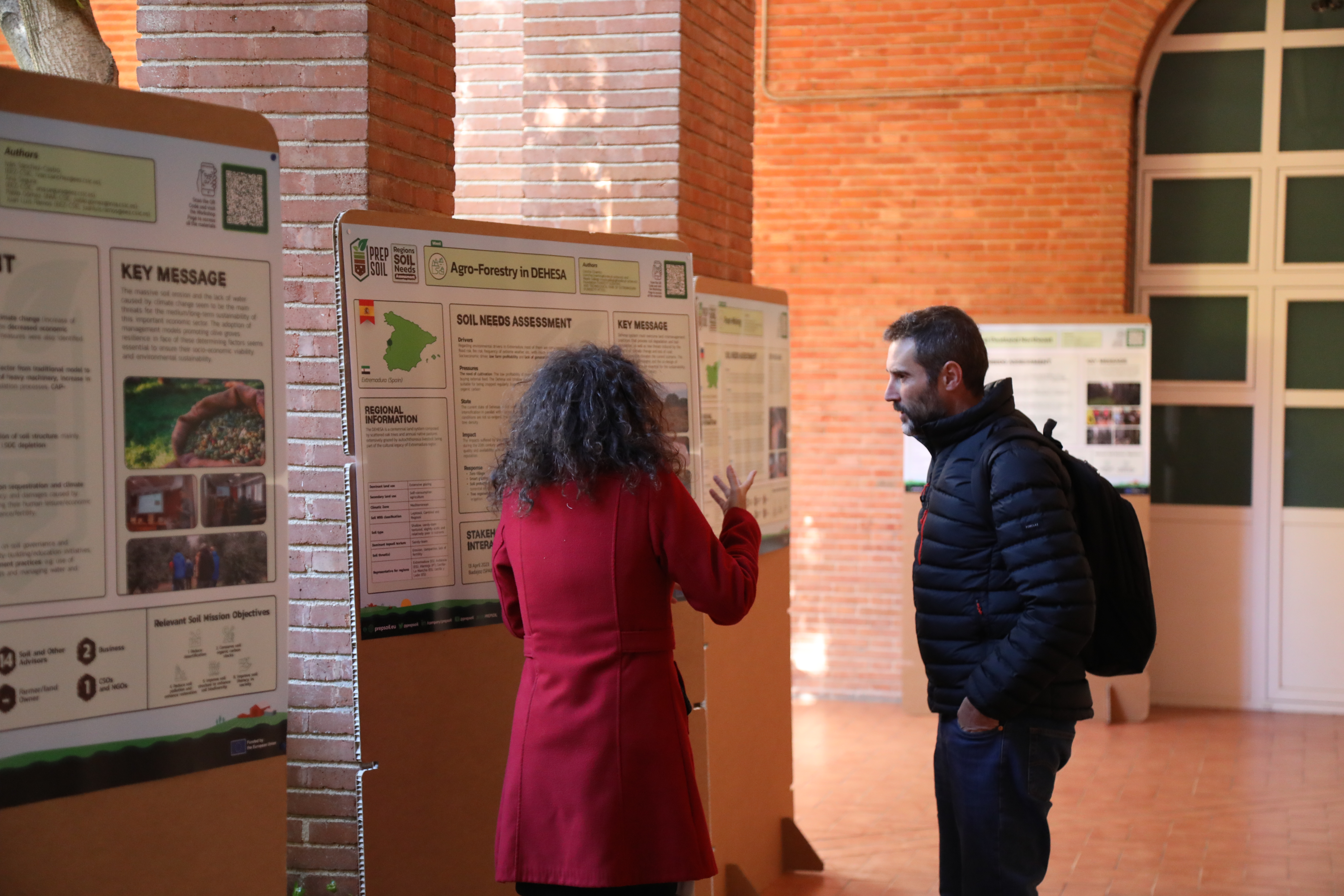
As part of the event, the Mission Soil-funded project PREPSOIL organised an exhibition of 20 informative posters on the regional soil needs. The posters were created through a meticulous process that involved synthesising data and insights gathered from regional soil needs workshops held across 21 European regions.
|

|
|
|
|
|
Outcomes from the event
|

|
Event report
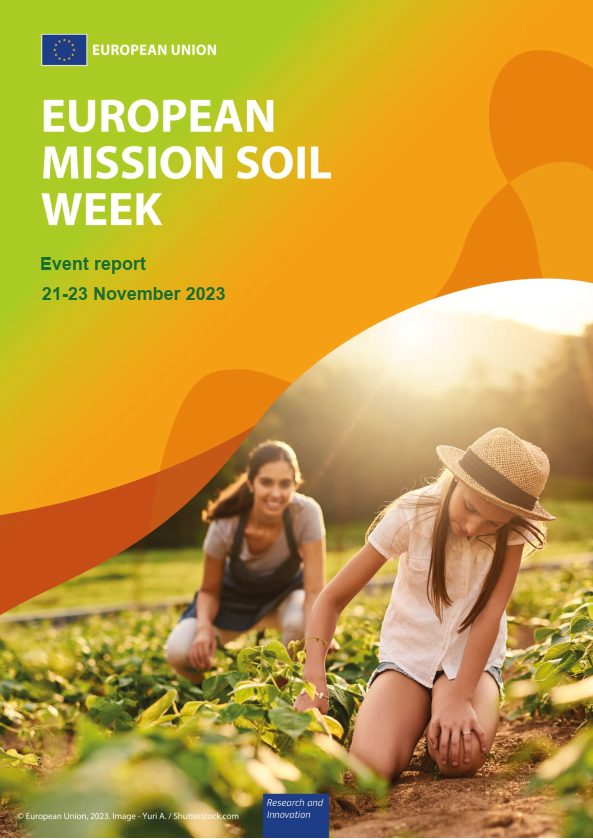
Get to the heart of the discussions, presentations, reflections and ideas emerged during the European Mission Soil Week.
Our event report offers a comprehensive summary of all plenary and breakout sessions. Dive in and get an insight into the priorities and solutions for improving soil health in Europe.

Post event video
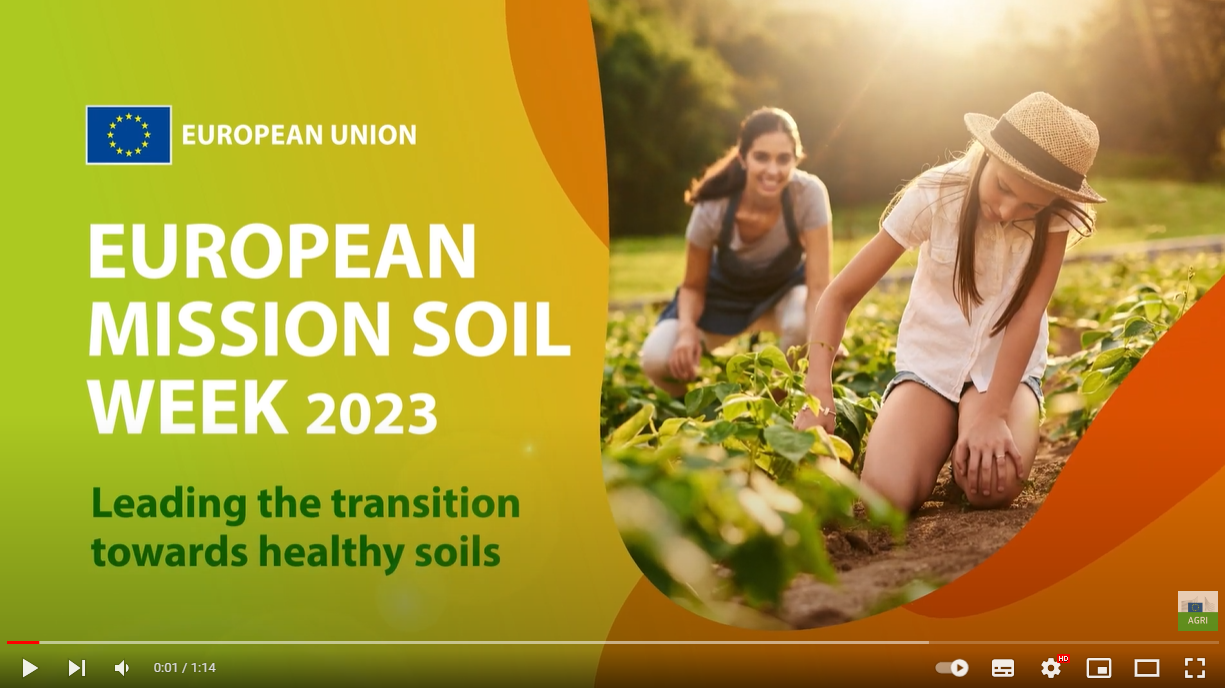
Take a look at the best moments resulting from the three-day event, captured in the video: images, insights, statistics,interviews and personal testimonials from esteemed speakers.
Find out what made the European Mission Soil Week special!

Graphic recordings
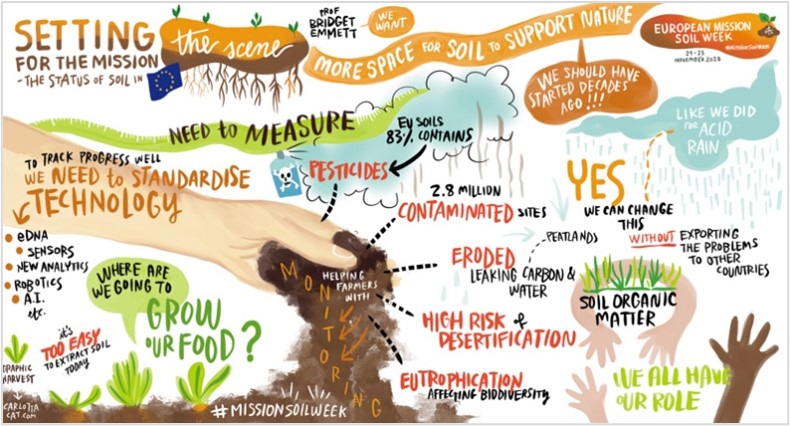
During the European Mission Soil Week, we had an artist creating stunning visual summaries to the plenary sessions, discussions and presentations. You can access the images on the Mission Soil website.

|

|
|
|
|
|
Update on the Mission Soil Manifesto
|

|
A growing community
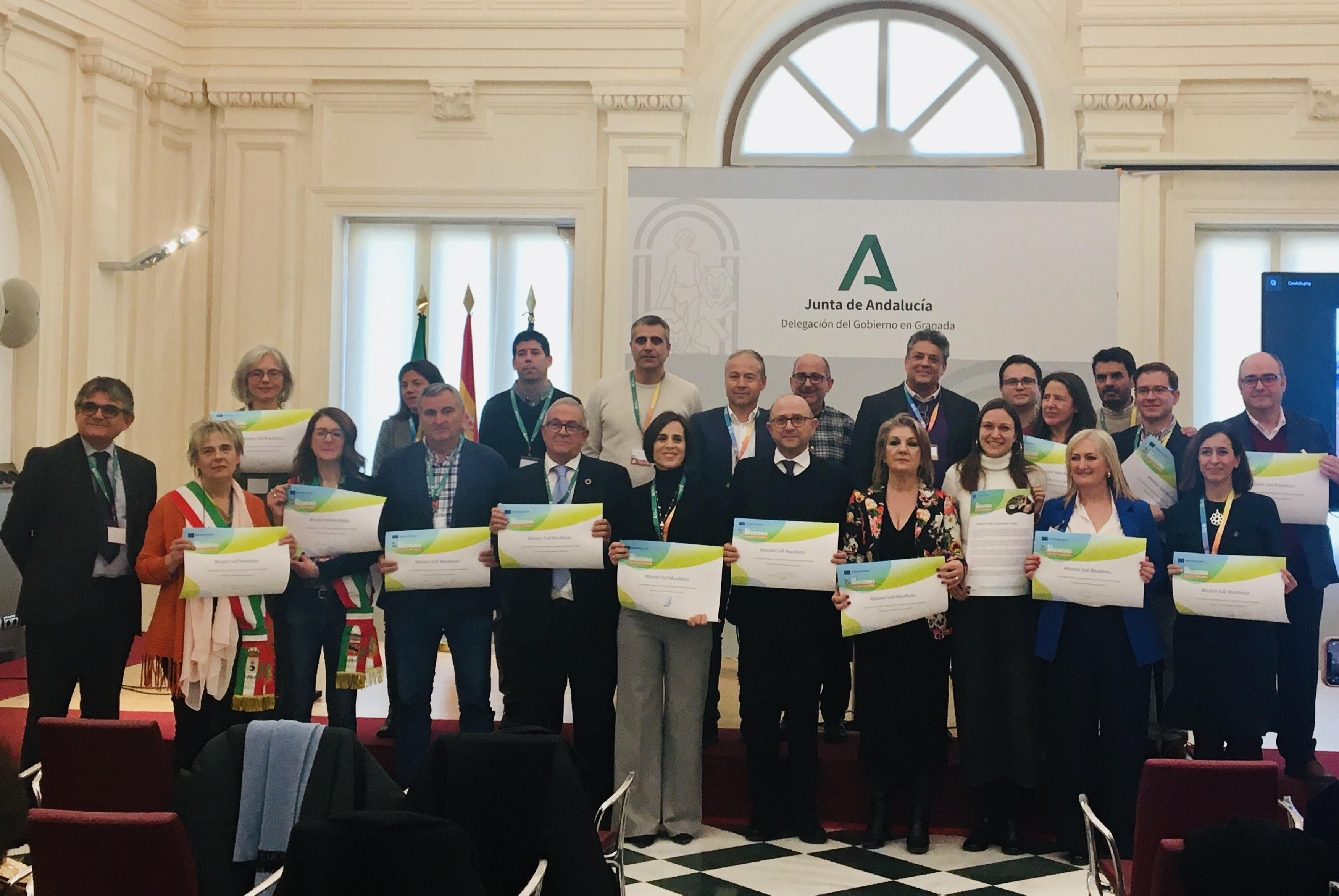
The Mission Soil Manifesto aims to foster local knowledge, innovation, and investment in soil health by raising awareness. Signatories of the Manifesto will be able to join a vibrant soil health advocacy community and have access to the latest research results, along with the opportunity to take part in knowledge sharing activities and events to exchange best practices on how to improve soil health in Europe and beyond. This non-legally binding document can be signed, for example, by representatives of municipalities, regions, private or public companies and organisations, NGOs and philanthropic organisations, educational and research institutions and by individuals as well. The Manifesto, available in all EU languages, has so far received 2 657 signatures, including 430 legal entities, publicly visible in the dedicated webpage. To sign the Manifesto and join the Mission Soil community, click here!
Meet one of the Mission Soil Manifesto Signatories
We asked one of the Mission Soil Manifesto Signatories, María Cruz Ferreira Costa, to tell us more about why it is important for municipalities to sign the Mission Soil Manifesto. Maria Cruz Ferreira Costa is Director General of the Regional Secretariat on Energy, Sustainability and Climate Action of the Region of Murcia, and an EU Climate Pact Ambassador.
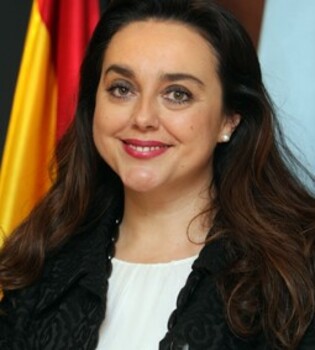
‘I believe that sustainable soil and land management are essential for supporting soil’s function and its vital ecosystem services, including food supply, water purification, nutrient cycling, carbon storage and support to biodiversity. Soil plays a growing role for climate change mitigation and adaptation.
I encourage municipalities from the region of Murcia and all European regions to be part of the solution. This is a crucial research and innovation programme with a strong social science component.
By signing the Mission Soil Manifesto, you can all help develop a more harmonised framework for soil monitoring in Europe and raise awareness of the vital importance of soils.’
|

|
|
|
|
|
Event participants testimonies
|

|
|
We are delighted to have received excellent feedback from our participants on all fronts – content, speakers, sessions and overall organisation. Here are just a few snippets from our feedback survey:
‘It was interesting in scientific content, well organized, dynamic and amusing!’
‘It was a very well-organised event, with very enlightening talks and a very important overview of the mission.’
‘The photo competition was very interesting and a nice way to engage citizens as well.’
Be on the lookout for European Mission Soil Week 2024! Follow the Mission Soil social media platforms to stay updated on the latest news and developments.
You can also visit the Mission Soil Platform to stay on top of all our activities.
  
|

|
|
|
|
This newsletter is published by the European Commission's Directorate General for Agriculture and Rural Development.
Subscribe | Unsubscribe | Legal notice
|
The European Commission is committed to personal data protection. Any personal data is processed in line with the Regulation (EU) 2018/1725. Please read the privacy statement.
|
|
ISSN: : 2811-7743 | CATALOGUE NUMBER: KF-AT-24-001-EN-Q
|
|
 |
|